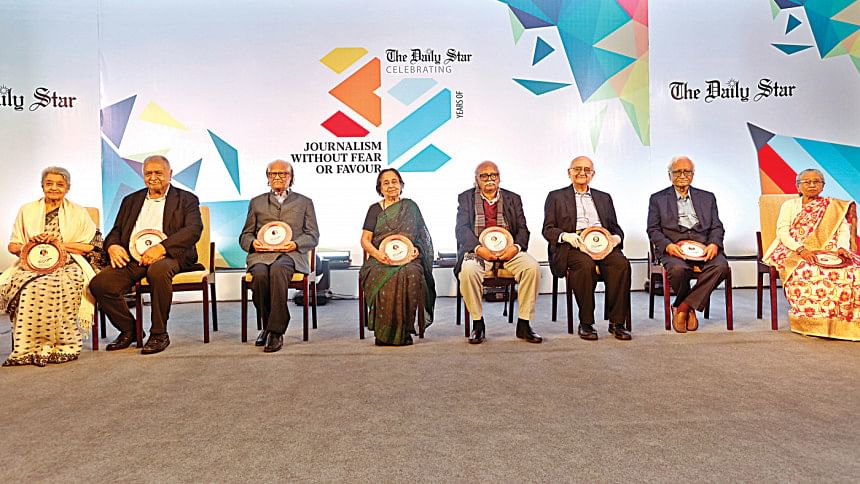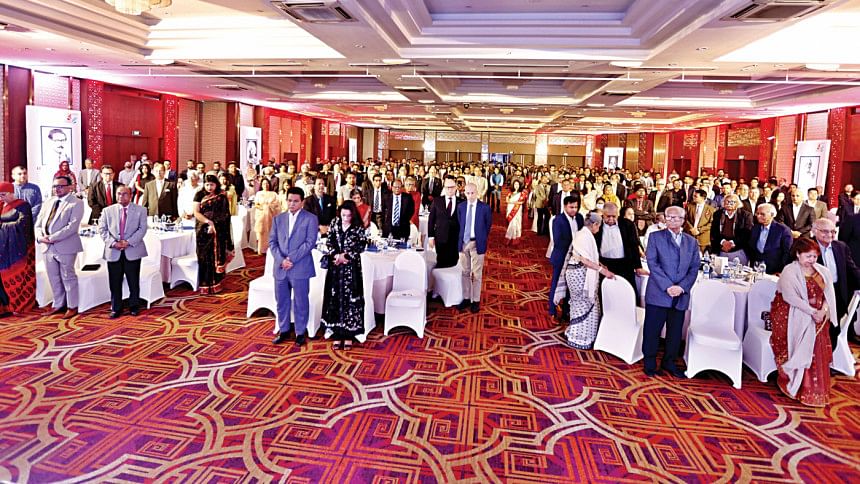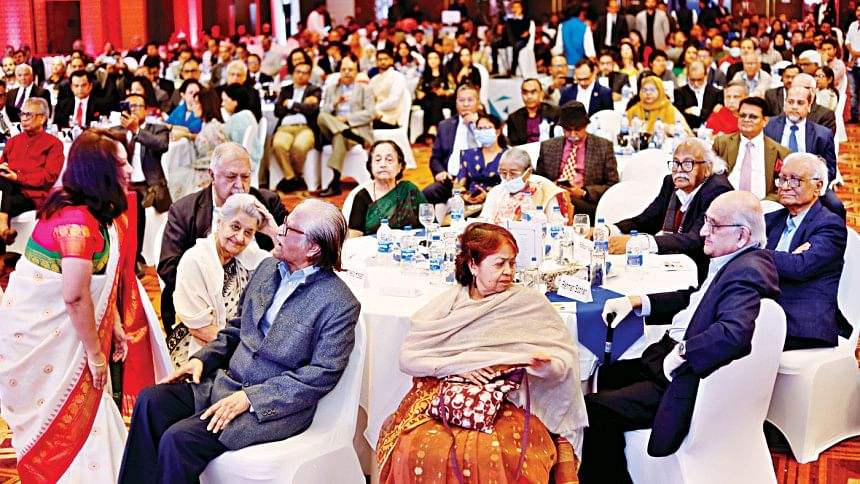12 champions of freethought honoured


The Daily Star, which promotes freedom of thought and expression, recognised some of the country's thought leaders who contributed to the progressive journey of Bangladesh, at the 32nd anniversary event of the newspaper at the Radisson Blu Water Garden Hotel yesterday.
The ability to think is something that distinguishes humans from all other living beings. The thinking can take place only in a free environment. Thus, freedom of thought is one of the fundamentals for the progress of civilization, said the honourees.
The 12 eminent citizens honoured are: jurist Dr Kamal Hossain, Prof Serajul Islam Choudhury, cartoonist Rafiqun Nabi, Prof Abdullah Abu Sayeed, Prof Rehman Sobhan, writer and researcher Jatin Sarker, writer and political activist Badruddin Umar, language movement veteran Ahmed Rafiq, human rights activist Hameeda Hossain, artist Mustafa Monowar, educationist Sharifa Khatun and women rights champion Noorjahan Bose.
The event began by paying respect to Abdur Rouf Chowdhury, the founding director of The Daily Star, who passed away yesterday. All stood for a minute in silence.
Simeen Rahman, on behalf of the Mediaworld Ltd board of directors, presented framed photos and crests as tokens of love and appreciation to the trailblazers of freedom of thought as the audience, who gave them standing ovations.
Addressing the event, Rokia Afzal Rahman, chairperson of the board of Mediaworld, the parent company of The Daily Star, said over the years, the newspaper greatly consolidated its position as a beacon of intellectual freedom and upholder of human rights.
In a video message, she said the future of the newspaper is full of challenges that came following the coronavirus pandemic, the Ukraine war, and its consequent chaos in the global economy.
"However severe the crisis, we promise to continue to serve our readers with the latest and most authentic news available," she said.
The Daily Star Editor and Publisher Mahfuz Anam then introduced the extraordinary personalities recognised by The Daily Star amid rounds of applause.
He said, "By honouring them, we not only honour ourselves, but also raise a very pertinent question as to how we can do more to create an environment that will produce more thinkers like them.
"Through their writings and artistic creations, these people have helped us to open our minds, to become aware of the oppressive environment from which we needed to free ourselves, and have the vision of the future towards which we must strive.
"This legacy we must not only honour but also nurture to enable our present and future generations to follow and aspire to become like them."
In a video message, Badruddin Umar said freedom of thought and freedom of expression are necessary to live as human beings. "The question, however, is whether there is any freedom of thought [in the country]."
He stated that there is a need for a conducive environment for free thinking. "It is very disappointing that there is no such environment in Bangladesh… The situation is getting worse day by day. People's freedom of thought and expression is completely under threat."
Hameeda Hossain said the freedom to think, the freedom to write, and the freedom to discuss with everybody are very important elements for making society more democratic.
Language movement and the student movements of the 1960s were for the struggle for independence in which people talked about nationalism, socialism, and so on.
"We can see from this struggle for independence in Bangladesh how important it was to have freedom of thought, freedom of expression, and for people to have the freedom to discuss their various diverse views and opinions," she said.
"Freedom of thought and freedom of expression are nobody's gift to you. It will only come if you assert your rights to exercise that freedom. This means if you do so in sufficient numbers, you will then capture freedom and no one will be able to take it away from you."
"I think the young generation should fight for their freedom of speech, freedom of writing ... I want them to stand up and fight for their freedom and for the country."
"And I think, along this line, it is the very important freedom of thought in which the media, both the print and electronic, have played a very strong role."
Jatin Sarker said he has dedicated all his life to the freedom of thought.
"Had the thought not been free, doing anything would not be possible for humans. Humans are the only animal who can think and express themselves in language," he said, adding that it is the thought that creates relations between people.
"Debate is not possible without free thinking," he added.
Eminent jurist Dr Kamal Hossain said controlling a society becomes possible when freedom of thinking does not exist.
He said that different kinds of views, opinions, and counter-opinions can be expressed in an independent society with which it can make progress.

Mustafa Monwar said freedom of thought is ultimately beneficial for the people.
"Whoever believes in the freedom of thought can never only think for their own sake," he said.
When people lose the power to think, they repeat what others say, he said.
"Such a person can be very cruel … there must be free thought and cultural development… ."
Noorjahan Bose said, "I don't want to live by an ideology or in a country where I cannot speak, write, and express my thoughts freely. If necessary, I will live in a hut or go hungry but I must have the right to express my free thought."

"I believe I'm ready to sacrifice my life for free thinking," she said.
Rafiqun Nabi said, "We have not yet achieved everything after the Liberation War… We must progress… . For that, we'll have to think freely."
Prof Rehman Sobhan said freedom of thought is only meaningful if there is an independent medium of expression.
The greatest beneficiaries and supporters of independent thinking should be the government itself.
"Those who wish to express themselves freely and independently through an independent media found that their voices have been suppressed because the media itself faces the dangers of suppression."
Prof Serajul Islam Choudhury said the freedom of expression is closely connected with the evolution of thinking and moves ahead in a dialectic manner.
He said freedom of thought is as necessary as one needs two legs to walk. Democratic culture grows when newspapers have the freedom to express opinions and publish news independently.
"A society that lacks thoughtfulness is called a lifeless society… We cannot protect humanity if there is no freedom of thinking," he said.
Sharifa Khatun said freedom of expression, opinion, conscience, and the media are crucial.
"Without these, there will be no creativity. Without creativity, this country will not progress," she said.
Eight of the 12 champions of freedom of thought were present at the event in person and they gave messages to the young generation.
Prof Rehman Sobhan said, "Freedom of thought and freedom of expression are nobody's gift to you. It will only come if you assert your rights to exercise that freedom. This means if you do so in sufficient numbers, you will then capture freedom and no one will be able to take it away from you."
"Keep in mind, you have to always speak up and assert yourself. That is how freedom is earned."
Prof Serajul Islam Choudhury said three things are required: first is the pursuit of knowledge, without which people will not be able to flourish. Second is socialisation because knowledge cannot be pursued alone; this knowledge has to be acquired from others and disseminate to others.
"The third thing that the young generation should especially have is courage. I wish that you will have these three things combined in yourself."
Among media personalities present were Prothom Alo Editor Matiur Rahman, Acting Editor of Samakal Muzzammil Husain Monju, Jatiya Press Club President Farida Yasmin and General Secretary Shamol Datta, Jugantor Editor Saiful Islam, novelist Anisul Hoque, magician Jewel Aich, filmmaker Amitabh Reza Chowdhury, Tariq Anam Khan, actors Shahnaz Khushi, Brindabon Das, and journalist Sabir Mustafa.
Awami League lawmaker Saber Hossain Chowdhury, BNP leaders Mirza Fakhrul Islam Alamgir, Iqbal Hasan Mahmud Tuku, Khandaker Mosharraf Hossain, Amir Khasru Mahmud Chowdhury, Zahir Uddin Swapan, Shahiduddin Chowdhury Annie, former president of the Federation of Bangladesh Chambers of Commerce and Industry AK Azad, former special adviser at the ILO Rizwanul Islam, former ambassador Shamsher Mobin Chowdhury, and Russian Ambassador Aleksandr Mantytsky were also present.
Pran-RFL Group Chairman and CEO Ahsan Khan Chowdhury, Eastern Bank Managing Director and CEO Ali Reza Iftekhar and Bangladesh's first finance secretary Mohammed Matiul Islam were also there.
The Daily Star Executive Editor Syed Ashfaqul Haque spoke at the event moderated by singer and journalist Elita Karim.

 For all latest news, follow The Daily Star's Google News channel.
For all latest news, follow The Daily Star's Google News channel. 



Comments